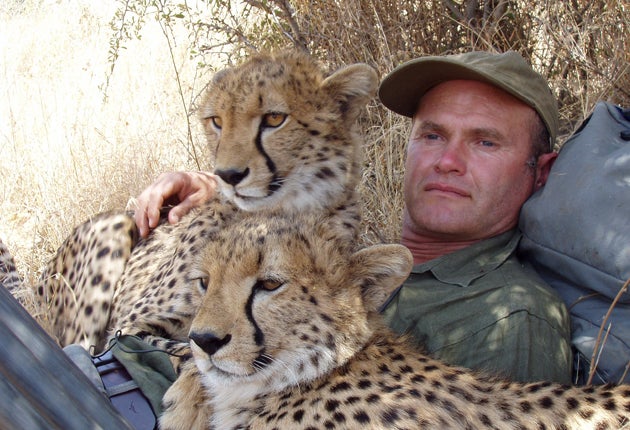A life on the wild side: What makes wildlife presenter Simon King tick?

Your support helps us to tell the story
From reproductive rights to climate change to Big Tech, The Independent is on the ground when the story is developing. Whether it's investigating the financials of Elon Musk's pro-Trump PAC or producing our latest documentary, 'The A Word', which shines a light on the American women fighting for reproductive rights, we know how important it is to parse out the facts from the messaging.
At such a critical moment in US history, we need reporters on the ground. Your donation allows us to keep sending journalists to speak to both sides of the story.
The Independent is trusted by Americans across the entire political spectrum. And unlike many other quality news outlets, we choose not to lock Americans out of our reporting and analysis with paywalls. We believe quality journalism should be available to everyone, paid for by those who can afford it.
Your support makes all the difference.Simon King's first memory is of an animal – an ostrich – trotting ahead of his mother's car. "I was sitting on my mother's lap, and she was saying 'bloody ostrich!', because it wasn't getting out of the road." He has come a long way since then, but he has never stopped at wildlife with rapt fascination.
King, who has just published a memoir, Wild Life, is a natural history filmmaker who worked on some of the BBC's best loved programmes, from Big Cat Diary to Blue Planet. He's known to most of us, however, as the chap who gets sent by Springwatch and Autumnwatch to far flung corners of Britain to watch red deer rutting on Rum, or hares hopping across Islay.
King was born in Kenya in 1962. The ostrich is his only memory of his early life there; his family moved back to the UK two years later, and he didn't return to Africa for 21 years. None the less, he was already besotted by the natural world. "A sparrowhawk arriving in the back garden would leave me with a smile that lasted two days," he remembers. "I came in for stick at school as a nerd and a birdwatcher, but luckily I didn't care." When his father, a television director, cast him in The Fox, a drama about a young boy who befriends the titular animal, his close relationship with creatures – and with the camera – was cemented.
His book is packed with wild encounters: he has lived with meerkats in southern Africa; trailed dingoes in the Australian outback; raised orphaned cheetahs; seen off digruntled buffaloes and elephants; and been attacked by all manner of angry insects. He has also followed the lives of a pride of lions in the Masai Mara for, on and off, the best part of 20 years.
However, he says, "Because I'm lucky enough to travel a lot, and because I now don't differentiate between East Africa and East Sussex, I'm as thrilled to watch a group of fallow deer rutting as I am to see wildebeest crossing the Mara River. The exotic nature of life on earth is not in itself the allure; the thrill is in the detail of the lives, in understanding the behaviour, in getting inside the world of other creatures and sharing it."
When he first joined Bill Oddie and Kate Humble for Springwatch's precursor, Wild in You Garden, "There were great tracts of us just saying, 'Errrrr . . . There's nothing much happening . . . '" As the birds' nests lay undisturbed, and the foxes avoided the film-makers and kept to their dens, "Our producer's hair started falling out! But then we found out that lots of people were watching and getting into it."
This summer, as their children sit inside playing video-games, parents are being exhorted to take advantage of the exciting natural possibilities beyond their doorsteps. "Children don't get out enough," says King. "There's a generation suffering from what the Americans call 'nature deficit disorder'. Every toddler is interested in other living things; what's curious is that it starts to evaporate for some. I want to maintain that connection. If you feel like you're connected to the rest of the planet, you're going to care about it much more.
"Wherever you live, even in the most built-up urban centres, there is something to see. If my wife and I walk down Kensington High Street, she'll spot a friend on the other side of the street and a nice pair of shoes. I'll see a peregrine and a flock of Canada geese."
Wildlife programming must be good for both body and soul: not only does every natural history presenter seem nice, well-adjusted and pleasantly nerdy; they also share a remarkably youthful aura. Chris Packham looks barely a day older than he did on The Really Wild Show; David Attenborough is still working well into his 80s; and King – barring incipient baldness – could be an eager schoolboy.
"The natural world is good for you," he says. "Feeling as if one is included in the planet is a lovely, healthy place to be. Also, I regularly have to hike up and down hills carrying 30 kilos of camera kit."
Wild Life, by Simon King, is published by Hodder & Stoughton, £20.
Join our commenting forum
Join thought-provoking conversations, follow other Independent readers and see their replies
Comments